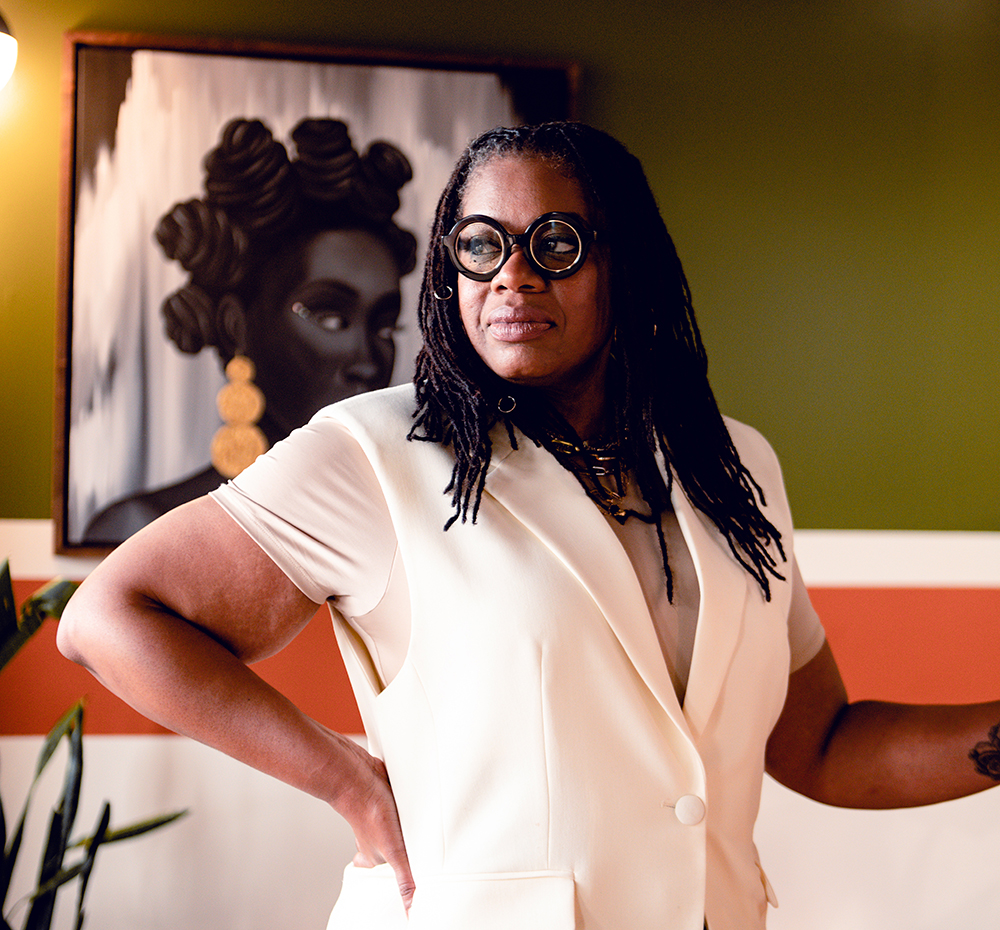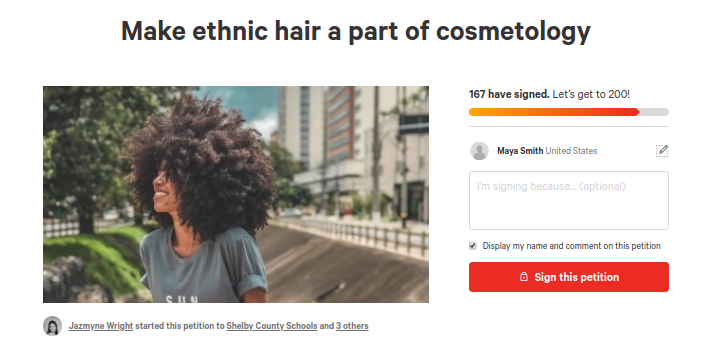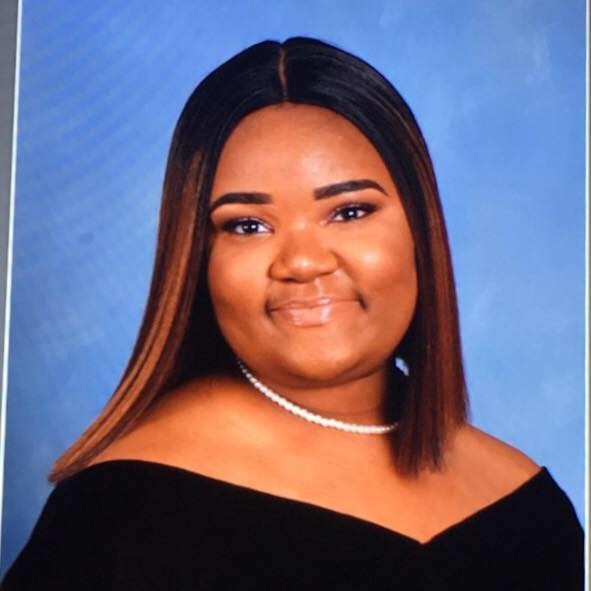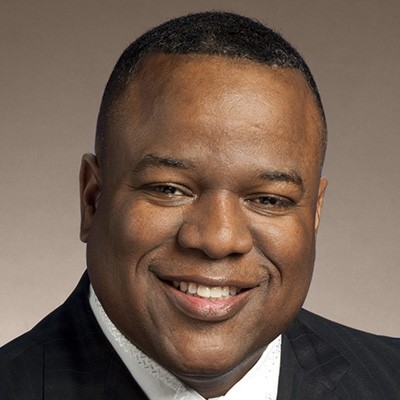When TaKeisha Berry Brooks set out on her career path, she had no idea where it would lead. A love for styling hair grew into much more, something that would ultimately empower her — and her community.
The South Memphis native has cemented herself as a natural hair stylist and pioneer. She’s the CEO and founder of A Natural Affair hair salon, with locations in Memphis and Cordova, which specializes in natural hair care transitioning and maintenance for locs. Brooks and her husband also own the hair care brand De•Fine Natural Hair.
This year marks a special one for Brooks, as she’s celebrating 15 years of having an “established salon.” “It’s a celebration within itself,” she says. “Business is hard. Business is very hard to not only get up and running, but also to maintain and keep a running engine.”
Along with commemoration, there’s reflection and introspection, as Brooks’ story goes beyond the walls of her business.

Beauty Shop Youth
Growing up in the historic Glenview community, Brooks was raised by her mom, Shirley Pruitt, and her grandmother, Mable Washington Ivory. Brooks’ mother would later get married, and through this union, she learned the value of entrepreneurship, as her parents ran a successful real estate company, A Mortgage Link.
While business was always “her foundation,” one of the most influential players in Brooks’ upbringing was the hair salon. From an early age, she saw the salon wasn’t just a business. It served as a way for her and her mother to spend time with one another — Saturday at the beauty salon was their time. Getting their hair styled together gave Brooks and her mother the opportunity to bond, but it also gave Brooks the chance to see the inner workings of the shop, and how it came to life.
“I remember running around during the early part of my years and my mom used to take us every week, or every two weeks. It was a big part of my life,” Brooks says. “Just getting my hair done and experiencing different stylists in the salon — and we stayed at these salons for years. It wasn’t one of these things where we were jumping all over the place — we had established relationships with these stylists. They were always making everybody pretty and they were always making money.”
This gave her glimpse into a world in which she’d later make a name for herself. For Brooks, there is a life before and after realizing the magic within the salon. At first, she saw stylists as simply professionals providing services to clientele in need of primping. But when she was around 12 or 13 years old, she started to take interest in it as an art. “I would walk up to them and watch them do hair,” Brooks says. “Some of them would let me and some would be like ‘why am I staring at them’ as if it was a bad thing. What they didn’t know is I was so inspired and amazed by what they were doing.”
While uncovering that magic would be essential to her dream, the concept of community found within would forever be at the center of her vision.
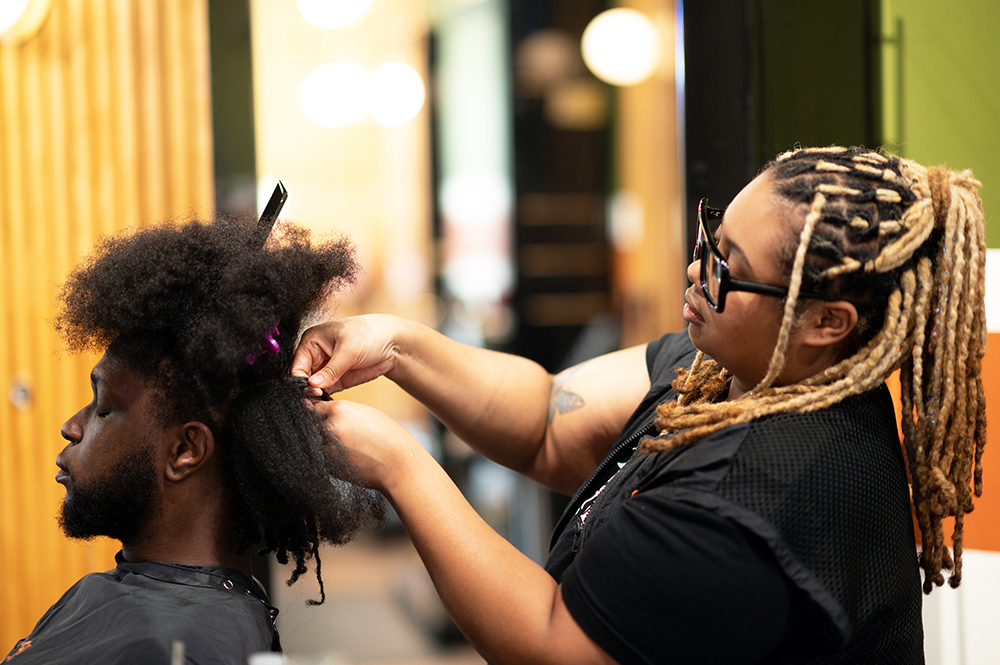
Style, Naturally
After becoming a licensed cosmetologist in 1998, Brooks realized natural hair wasn’t in the mainstream like other Black hair services. “It was a very small community of clients, and it was a very small community of stylists at the time that were offering natural hair and braiding services,” she explains.
Brooks is candid about how she didn’t always embrace her own natural hair, and natural hair wasn’t even what she originally sought out to do. She was initially driven by the trendy styles of the time such as weaves and relaxers. Brooks felt that catering to popular culture was crucial to her success, but she soon found her calling would pull her in the opposite direction.
These were the wild west days of natural hair licensing, and while she had a full cosmetology license, she found herself only serving the small percentage of women who had decided to wear their hair chemically unaltered. This was also when Brooks began to perfect her craft with the help of her fellow stylist, Donna Bookman.
“She was one of my salon mates and was the one who really taught me a lot of the natural hair [techniques] like partings and things of that nature. I already had a sense of doing it, but she helped fine-tune it more for me,” Brooks says.
This would be the start of her journey toward mastering the art. Brooks soon saw an opportunity to fill a much-needed gap in the industry, and she took the next step in becoming a natural hair specialist by offering Sisterlocks services in the area. The styling method, created by JoAnne Cornwell, from San Diego, California, in 1992, uses a locking tool to install micro-thin dreadlocks with a locking pattern.
“My mom is the one who invested in me. She had Sisterlocks before people were getting Sisterlocks. She sent me to Atlanta, and I took the class and I came back and started establishing Sisterlocks [here],” Brooks says. “I was the second person in the state of Tennessee to actually take the training and be certified.”
At the time, Brooks saw that being able to offer “a trademarked system” to her clients was a big deal. But she didn’t realize how impactful it would be. Natural hair wasn’t just a hairstyle, but a lifestyle — and, in some cases, a form of liberation.
From there, Brooks delved further into natural hair care. “My path and my journey began to take me on something different,” she says. “That was number-one starting out with Lisa Akbari. For a brief time I worked for her, and one of the things I learned [about] was that she has a trichology facility.”
Akbari serviced clients who were experiencing hair loss and suffering from conditions such as alopecia. The harmful effects of chemical relaxers weren’t widely understood at this time, but Brooks’ exposure to this side of hair care made her rethink her role in the industry. “We didn’t have the knowledge that we have now that chemicals and chemical relaxers were very damaging,” she says. “I just knew that I didn’t want my people [losing hair and] trying to get their hair back.”
She began to build a dedicated clientele requesting braids (which she mastered with the help of Fatou Jangum), micro braids, locs, and more. And while Brooks’ work spoke for itself, her clients began to question her true commitment to natural hair.
“A few clients who were committed to me were like, ‘Okay, when are you going to practice what you preach?’ Like, you can’t be doing natural hair and you have relaxed hair,” Brooks recalls.
She took her clients’ remarks to heart. In order to inspire and teach, she needed to become an expert in her own hair.
“People got to be able to visually see me become and be what I was selling,” she says. “At the end of they day they were in a space where they were wanting information. There wasn’t a whole lot of us out here giving the information, or who could even translate the information because we didn’t know what was happening in this community that was being built.”
Brooks grew her natural hair out and “embraced what she was transitioning to become. … I haven’t had a relaxer since 1999,” she says.
As natural hair became a mainstay in both Brooks’ life and the Black community, it beckoned to be celebrated. Brooks notes when more people saw the versatility of their hair in its natural state it called them to try different updos and styles. The movement had come a long way culturally, but societally it still faced obstacles. While women and men have celebrated their manes for years, systemic inequities halted progress in the world at large.

Be Who You Are
Brooks calls the early reception of natural hair in the workplace “very discriminatory.” She remembers having clients coming in to get their natural hair styled but opting to throw on a wig because they had a job interview to prepare for. “For a long time that was a big thing, and I realized that was something I had to learn how to help these women become comfortable with — being who they are,” Brooks says.
Her salon became a source of empowerment as she helped women take on a world that had misconstrued ideas about what professionalism looked like. But these charges weren’t germane to her salon, nor her clientele.
One of the stories crucial to understanding Brooks’ legacy as a changemaker is told with the help of her oldest daughter, Destini Berry (25).
Growing up in a salon provided Berry the opportunity to not only be in a space where she was surrounded by women that looked like her, but where they were praised for their individuality. Without these experiences, she says, she may have had an “identity crisis.”
Berry recounts her childhood, saying she “had a lot of problems with her hair.” She was enrolled in a predominantly white school as a child, which impacted her concept of beauty. She was suffocated by the celebration of Eurocentric beauty standards and recalls believing that features such as “long, blond hair” were the desirable aesthetics — a stark contrast to her locs. “I didn’t see anybody that looked like me in the school.”
These comparisons followed her into her extracurriculars, as Berry was also enrolled in ballet. Ballet was something she adored, but it was always associated with the word “neat.” It seemed to be an aspirational word to describe movement, technique, and, of course, appearance.
Her instructor didn’t deem Berry’s locs appropriate for a recital and told her she wouldn’t be allowed to dance unless her hair was changed. Berry remembers crying, thinking she would have to cut her hair off in order to adhere to the ballet school’s standards. However, through this, her mother was at her side and fought for her to dance with her locs in place. Ultimately, Berry was allowed to do just that.
“My mom was awesome in that situation,” Berry says. “She fought for me and she really explained discrimination to me at a young age, being profiled that young and not understanding the magnitude of that situation. Now that I am an adult, I appreciate how my mom handled it.”
While Brooks believes Berry’s story is her own to tell (she even wrote a book about it, titled I Just Kept Spinning), it marks a moment in which she stood her ground. This tale is symbolic of Brooks’ role as a mother, but it also shows her passion for change and fighting for people. Berry’s right to dance sparked a conversation, and it served as an opportunity for the community to reassess what was deemed “professional” and “neat.”
“That created a sense of respect, for me, as an impactful leader in the community,” Brooks says. “Not only taking up for my daughter, but exposing people to the fact that my daughter has natural hair, someone just tried to stop my daughter from being who she was naturally, and basically telling her. ‘It’s something wrong with you.’ How dare you tell someone that? Especially a child?”
Through advocating for her daughter, Brooks gained the wherewithal and knowledge to teach her clients about what discrimination looked like.
“I’m telling these Black women, ‘Hey this is what’s happening.’ This [was] me educating Black women about what discrimination is against natural hair, especially in the workplace.”
In an effort to further advocate for the community at large, in 2012 Brooks founded the Naturals In The City Hair and Wellness Expo in Memphis. “It was a community awareness event for the then-growing natural hair movement, educating and celebrating natural hair and wellness enthusiasts,” Brooks says. “It included classes, a vendor market, positive pageants, fashion, brunches, and more. It introduced and exposed small businesses that served a need and local and national experts who educated attendees on proper hair care, product knowledge, mental health practices, and healthy food and wellness options.”
Brooks often receives requests to revive the expo. She says it served its purpose then, but she has ideas about how it can serve those in the future.
Change and Growth
A lot has changed in the way society reveres and respects natural hair since then. The CROWN (Creating a Respectful and Open World for Natural Hair) Act was passed in Tennessee in 2022, which prohibits companies from discriminating against their employees based on their hairstyles. “I think that has helped with taming the discrimination against natural hair and how we wear our hair,” Brooks says.
Brooks’ career is also marked by change — and milestones of her contributions toward natural hair acceptance. But that journey has been more than hers alone.
“[It’s] not just the people whose hair I’ve done, but also all the people I have encountered and all the people who come in and have worked under me, who have learned and grown in their own ways, which shows I’ve done what I’m supposed to do as a leader.”
The opening of A Natural Affair 15 years ago was Brooks’ transition into business ownership, and even with the remarkable success of her salon thus far, she knows there’s more work to be done.
“I really haven’t talked about the space where I am now,” Brooks says. “I say it all the time, ‘Yes I’m retired from behind the chair, but I’m still working’ — it’s not one of those things where I’m sitting back with my feet kicked up.”
Brooks received her educator’s training from Empire Beauty School in 2016, which allowed her to help “mold emerging students to professional and knowledgeable natural hair professionals.” In 2017 Brooks became an educator for Design Essentials Haircare after being recommended by Emmitt Bracey, Mid-South regional distributor for the brand. She later worked in educator roles at the Natural Hair Industry Convention under leader Susan Peterkin, and recently at the Bronner Bros. International Beauty Show, the largest gathering of multicultural beauty professionals in the U.S.
In 2022, A Natural Affair became the first salon to be a signature partner with Memphis Shelby County Schools’ College, Career, and Technical Education cosmetology program, through which students gain career training and experience via work study while also attending school during the day. Students are able to earn their cosmetology license in high school.
Today, Brooks continues mentoring and teaching the stylists at her salon, and through her work, inspires new generations of aspiring cosmetologists and hair enthusiasts.
Brooks lists a number of key players in her success, including her family, clients, and Mae Smith, owner of Essentials Beauty Supply, who gave her her first set of supplies when she was 20 years old. “She told me to come back and pay her when I start making money. I did just that, and I make sure I support her beauty supply to this day.”
“What I’ve gained from having A Natural Affair is that the more I have had it, the more it reveals to me and what I’m supposed to be doing, and how I’m supposed to be helping,” Brooks says. “It went from just being me to now having over 15 people working for me.”
And there’s no telling how many children come through the salon and are inspired in the same way she was in her youth.
